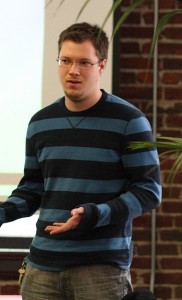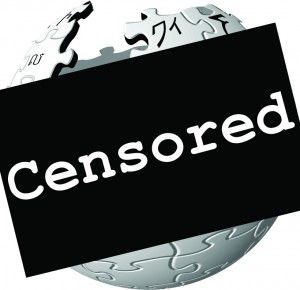Wikipedia is known throughout the world as a valuable source of information on almost any subject imaginable. Since its creation in 2001, Wikipedia has amassed over 30 million articles in 287 languages—over 4.4 million in English alone. This is made possible by the countless hours and efforts of volunteers, each contributing bits and pieces of his or her expertise. Unfortunately, despite the continued advance of technology, the act of writing paragraphs of prose has yet to be automated and still requires the efforts of humans.
But that does not mean that every part of Wikipedia is curated by hand. As we speak, automated software processes called “bots” are responsible for all manner of routine maintenance. These include removing vandalism from articles, sorting pages in and out of categories and checking for instances of copyright infringement on newly created articles. One of the earliest bots, Rambot, was created in 2002 to create articles on places throughout the United States, creating almost 37,000 Wikipedia articles in the process. This was made possible with data gathered from the U.S. Census Bureau and other agencies—more details are available here.
The idea behind the open data movement is that the massive amounts of data collected and generated by our government should be available for the people to use—not just published in reports, but in computer-readable formats so that they can be used in research and analysis. There are many uses of open data—journalists rely on open data to break news and businesses use open data as a component of their business plans.
Since open data is a valuable source of public knowledge, why not use it to improve Wikipedia and keep it up to date? Granted, Wikipedia is not intended to be an indiscriminate dumping ground of data and it would be inconsistent with its editorial policies to use data to come to novel conclusions not already published somewhere else. However, there are still applications of data that would suit Wikipedia’s mission. Many articles have boxes alongside the introductory section, containing quick facts about the subject of the article. In wiki-parlance these are called “infoboxes,” and the new project Wikidata allows people to upload infobox data to one place and then use it on every language edition of Wikipedia.
Wikimedia DC, as an affiliate of the organization that runs Wikipedia, is pleased to partner with the Sunlight Foundation to host the Open Government WikiHack, a hackathon dedicated to finding ways to use structured government data to improve Wikipedia. The event will be held all-day April 5–6 at the Sunlight Foundation’s offices in Washington, DC and will feature a mix of coders and non-coders, Wikipedians and non-Wikipedians. We want you to bring your ideas on how government data can improve Wikipedia, whether it involves the Sunlight APIs or another public source of information and we will give you the opportunity to make it happen.
What: OpenGovernment WikiHack
Where: Sunlight Foundation 1818 N St. NW Suite 300
When: April 5-6, 2014
Register: HERE.
There will be a happy hour At Sunlight Foundation on Friday April 4 and the hack will begin the next day.
Feel free to share with your networks with #wikihacks on Twitter and if you have any questions, please email us at: [email protected].
]]>
Dominic McDevitt-Parks during Campus Ambassador training
GLAM, the Wikimedian acronym for Galleries, Libraries, Archives, and Museums, equates to more than just the institutions categorized by the letters. It also encompasses the merging of communities. On August 13, 2012, Dominic McDevitt-Parks, the wikipedian-in-residence at the National Archives and Records Administration since May 2011, gave a talk labeled “Cultural Institutions and Wikipedia: a Mutually Beneficial Relationship” on what a symbiotic relationship between Wikipedia and a cultural institution can look like.
Introducing Dominic was Wikimedia DC’s own Kristin Anderson, who described the Wikipedian community to the Library of Congress audience as “the only people who like information as much as library catalogers are Wikipedians…Wikipedia and the Library of Congress share Thomas Jefferson’s dream of…information for everyone.”
In his talk, Dominic broke down how cultural institutions and Wikipedia can work together to form mutually beneficial partnerships. If the goal of an institution is to encourage the use of its materials, Wikipedia is a natural fit, being the 5th largest internet site. Dominic gave numbers and a visual to put it all into perspective. The National Archives website gets 17 million views a day. In contrast, a very conservative estimate of the number of views that the Wikipedia articles that use National Archives material receive every day is well over a hundred million. This isn’t pointing at a problem, but at a fact, and one that can lead to a solution for many institutions; Wikipedia provides a ready-made platform to spread not only information through articles, but also to put up source documents on sister projects Wikisource and Wikimedia Commons.
The National Archives takes full advantage of this online volunteer community by encouraging local Wikipedians to come to scan-a-thons and the online Wikipedian community to tag the uploaded scans and transcribe the text documents on WikiSource. Due to the tireless efforts of many Wikipedians, well over a hundred thousand documents have been scanned in and transcribed.
Even if the question of whether or not Wikipedia is a reliable source is raised, if a person sees a mistake on Wikipedia, it is up to him or her to make the change. Unlike other encyclopedias or collections, if people find a mistake on Wikipedia or one of its sister projects, they can correct it. There is a large community of editors watching to make sure the information is as accurate as possible. Recognizing that its own information is not infallible, the Archives has created a feedback page on its own website for people to post mistakes and corrections on.
Dominic summarized the role of a Wikipedian-in-residence nicely: the Wikipedian-in-residence provides access to the institution to the Wikipedia community and vice versa, which brings about not only community engagement, but also culture change within the institution itself, making it more open and accessible to the layperson. This is change which the National Archivist David Ferriero heartily embraces and encourages, in the words of one blogger during the National Archives ExtravaSCANza in 2011, “If it’s good enough for the National Archivist, it’s good enough for you.”
Lisa Marrs, Outreach & Program Coordination, Wikimedia DC
]]>
During Wikimania 2012, Jimmy Wales said that he hopes Wikipedia never has to black out again in protest, but that it can if the need arises.
According to Daniel Weitzner, Deputy Chief Technology Officer for Internet Policy at the Office of Science and Technology Policy, the government has kept its hands off of the Internet, allowing innovation to course and the Internet to grow from a small sideshow to the main event, from a small community of researchers to being an indispensable part of global infrastructure. If the Internet were to be an economic sector, he told the audience at the New America Foundation‘s panel discussion on Transatlantic Perspectives on Digital Rights and Online Privacy, it would make up 3.5% of GDP in all OECD countries. Despite this, there is still no Department of the Internet, which is a good thing, Weitzner explained, because of the very horizontal nature of the World Wide Web.
At the same time, we are becoming increasingly aware of the need to create legislation or norms to protect the privacy of the average Internet user. Although it is highly unlikely that an all encompassing, grand public policy treaty on the use and protection of personal information on the Internet will ever be signed, laws should still be made to protect consumer privacy and to let businesses know where boundaries lie. It’s not enough to let companies and people regulate themselves. In order to really make an effort to enforce consumer privacy and protection, the “bully pulpit authority” of government regulation must be used. This does not equate to infringing on the freedom of expression online, which would slow the growth of online businesses and innovation.

Anti-ACTA demonstrators in Tallinn
photo courtesy of Otto de Voogd (CC-BY-SA 2.0)
Three of the four panelists, Konstantin von Notz, Markus Beckedahl, and Jeanette Hofmann, all shared the German perspective on digital rights and online privacy. Beckedahl, the founder of netzpolitik.org, told the amused audience how in Europe, the potential for ACTA (the infamous treaty already signed by the US to strengthen copyright legislation) to be signed by their own governments created a stir. Starting with Poles literally jumping in the cold in protest of the treaty (the story of which was told during Wikimania 2012), demonstrations spread to Germany where tens of thousands showed up to protest any abridgement of online creativity, and then to different parts of Europe. Jeanette Hofmann, Co-Founder and Director of Alexander von Humboldt Institute for Internet and Society, announced her own plans to create a study challenging the pervasive economic assumption that copyright is essential to prevent market failure.
The fourth panelist was one of America’s own, Gigi B. Sohn, the director and co-founder of Public Knowledge, who managed to pull something positive out of the SOPA/PIPA fiasco. Americans, she said, are now more concerned about where their politicians stand on issues touching the internet. Even though SOPA and PIPA went to the backburner in the face of public outrage, Sohn warned that lobbyists are still pushing hard to increase IP protection through the creation of jobs in the IP department and through IP protection personnel in departments where ones haven’t been seen before.
There is a fundamental difference, Sohn emphasized, between legislating the content on the Internet and how that content gets there. The barriers to potential growth and innovation on the internet are not really created by controlling the on-ramps but by controlling the width and scope of the road itself, she said. Wikipedia itself helps to bring awareness to this issue. When Wikipedia blacked out in protest of SOPA and PIPA, Europeans began paying attention to the issue of government control of copyright on the Internet, said Beckedahl.
What we say on the Internet has global reach. The information we spread can touch the lives of people all over the world. Still, five billion people do not have access to the Internet, so there is still tremendous room for growth. In the spirit of providing free access to the sum of human knowledge, the Wikimedia movement should continue to raise awareness about potential legislature that may abridge that access and engage more people in the spread of information and the inevitable creativity and innovation that comes with it.
Lisa Marrs, Outreach & Program Coordination, Wikimedia DC
]]> There are so many ways the internet is censored all over the world. From a government perspective, internet censorship makes sense, especially if censorship is already practiced in traditional media. If communications via the Internet are free from control, then many regimes (especially the more repressive ones) fear loss of power and control over their populations. With governments loath to surrender any part of their sovereignty, to envision a future where an online civil society, like Cambodia’s, can match that of America or Western Europe in both scope and activity level involves quite a bit of stretching.
There are so many ways the internet is censored all over the world. From a government perspective, internet censorship makes sense, especially if censorship is already practiced in traditional media. If communications via the Internet are free from control, then many regimes (especially the more repressive ones) fear loss of power and control over their populations. With governments loath to surrender any part of their sovereignty, to envision a future where an online civil society, like Cambodia’s, can match that of America or Western Europe in both scope and activity level involves quite a bit of stretching.
Stretching is exactly what the six panelists from all over the world did at the Discussion on the Future of Censorship & Free Speech put on by the DC chapter of the Internet Society in conjunction with the US Department of State. Each panelist came from a country with heavy internet censorship, except for Koundjoro Gabriel Kambou, a journalist at Lefaso.net and the panelist from Burkina Faso. In Burkina Faso, Kambou said, the tallest hurdle for activist bloggers and social media networkers to jump isn’t direct government censorship but rather poor internet connection and unreliable electricity.
In contrast, Dlshad Othman, the panelist from Syria and an activist and IT engineer who provides Syrians with digital security tools, listed many occasions when the Syrian government turned off the Internet all together for citizens in certain cities. Othman also discussed the various types of websites that the Syrian government actively blocks, including Facebook and Twitter. Increasingly-resourceful citizen activists are now using proxies, such as Vertus Linux, as well as fluid cell phone connections to bypass the trojans and the prying gaze of the government.
In the United States, the government does have some control over the Internet, the extent of which includes disconnecting terrorist-related websites, tagging people who visit certain sites, and banning some uses of the Internet altogether, such as for child pornography and modern slave trade, where censoring these websites is for the legitimate purpose of protecting valued human rights. Despite these restrictions, the US and other Western countries boast of freedom of speech on the internet and criticize countries, such as China and Syria, which openly ban dissent and restrict access to certain websites.
In seeking praise and a better international image while hoping to attract multinational corporations, some countries proclaim that their citizens have complete freedom on the Internet while at the same time actively cracking down on Internet activists who expose corruption and espouse opposing views. Azerbaijan is an excellent example of this. One of the panelists, Emin Milli, is a famous activist blogger from Azerbaijan who received jail time for his activist work. The Azerbaijani government, being party to treaties that are meant to protect the free speech rights of citizen activists, charged Milli with “hooliganism,” in an attempt to avoid criticism from other countries and appear as to not be in violation of those treaties.
Similarly in Venezuela, the government does not openly limit what citizens say and do on the Internet. Venezuelan politicians, in fact, rank themselves based upon how many twitter followers they have, according to the Venezuelan panelist Andres Azpurua. But if a citizen says something anti-Chavez or points out local corruption, they might find their face on national television along with the description of “Imperialist” and “anti-Venezuelan,” making it easier for pro-Chavez/pro-government individuals to seek out the “Imperialist” and intimidate him or her in some way.
Even in India, Internet freedom seems to be facing some difficulties ahead, said Indian panelist and cyberlaw expert Pranesh Prakash, particularly after the Indian government started requiring that all Internet companies that wish to operate in India must physically move servers into the country. In Cambodia, according to panelist Sopheap Chak, the Deputy Director of the Cambodian Center for Human Rights, the government is cracking down on Internet companies and trying to create a culture of self-censorship, akin to the one already in effect in Venezuela, Azerbaijan, and all other countries where the government censors Internet use in some indirect way.
Open access to the Internet is an important aspect of the mission of Wikimedia DC. Millions of people seek information on Wikipedia and other Wikimedia proejct every day, and, sometimes, their access to these project has been hindered (as was the case with the Uzbek Wikipedia, which was blocked by the government there). While our mission is not to make governments open up the Internet in their countries, we do strive to make it possible that anyone who wishes to access or contribute to information on Wikipedia and Wikimedia projects should have the rights and the ability to do so. And when it comes to the Internet, we are all ultimately playing in the same sandbox, and although we do not all play by the same rules, we should all play nicely together.
Lisa Marrs, Outreach & Program Coordination, Wikimedia DC
Copyright info: Image by Mike Licht, imported from Wikimedia Commons under a Creative Commons Attribution 2.0 Generic license.
]]>

Picture courtesy of Aman Emoto
The United Nations Industrial Development Organization is a small branch of the World Bank, but it does big work. For the past six years or so, UNIDO has examined how networks between individuals, organizations, businesses, and governments affect economic growth and development.
When they began, there were only a few points of consensus about development economics: 1) that no universal solution to growth exists, 2) that knowledge is the key to effective policy-making, 3) that there are global public goods, 4) that inclusive governance systems are necessary to growth, and 5) that there needs to be South-South triangular cooperation. In all of the data they pulled together from a variety of countries and organizations, they found a steady positive correlation between the level of interconnectedness and intra-connectedness of countries and their citizens, and GDP per capita/government effectiveness: The more connected a government, businesses, organization, and individuals in a country were, the higher they landed in any economic index.
From all of the graphs and data the World Bank has presented, it is clear that there must be some relationship between networks & economic growth and government transparency & effectiveness. Building networks requires ample time and resources. Like growing an orchard, one cannot expect seedlings to give fruit after a year. Likewise, networks need time to take root and mature before endowing their benefits. At the release of fresh Networks for Prosperity information at the World Bank, a representative of Costa Rica, which ranks about the same as China in term of density and quality of networks, made the above point admirably. He said that networks are more of a force in Middle Income Countries (MICs) because those countries have diversified industries outside of the primary sector of agriculture and mining. This means that networks have the potential to bring even more business into the state as a matter of agglomeration and assurance that the government will not change policies abruptly after a company begins operation. A well educated populace able to take advantage of non-primary sector jobs combined with a transparent, well-connected government means less social unrest, which then leads to greater investment opportunities and so on.
So what can the global Wikimedia movement do to tap into this particular field of networks and make a positive difference globally? Wikipedia can already be accessed on mobile technology, and partnerships with mobile providers, like Orange and Telenor, allow for people in the Middle East & North Africa, and Asia & Southeastern Europe to access Wikipedia and all of its information for free. So we know that there are ways to get important information to people on mobile technology without costs to them. Combine that with the fact that the 87% of the world’s population will have mobile subscriptions by 2015, and what you have is a well-established network that can be an instrumental part of getting the right kind of information to the right people in accessible ways. One particular suggestion for utilizing the reach of that network (brought up during individual discussions at the event) was the possibility of creating a gov.wiki or a similar project as a space for governments and International Governmental Organizations (IGOs) to post their policies clearly, and where citizens can comment on how those policies are implemented on the ground.
Wikimedia DC is working on building relationships with various organizations, non-profits, government institutions, and embassies to coordinate edit-a-thons and hack-a-thons, along with cultural and educational events to engage local Wikipedians and Wikimedians and encourage new individuals to join the global knowledge movement. The support of this large community will help us to continually update and improve the world’s largest encyclopedia and its related projects.
To access the Networks for Prosperity report, you can visit (PDF link): http://www.unido.org/fileadmin/user_media/News/2011/UN%20Report%20LowRes.pdf
Lisa Marrs, Outreach & Program Coordination, Wikimedia DC
]]>The event, hosted at the Estonian Embassy, featured a discussion with Danny Weitzner, Deputy CTO for Internet Policy at the White House Office of Science & Technology Policy; Chairman Marko Mihkelson, Chairman of the Foreign Affairs Committee of the Estonian Parliament; Ian Schuler, Senior Manager for Internet Freedom Programs at the US State Department; and Rebecca MacKinnon, Bernard L. Schwartz senior fellow at the New America Foundation and a member of the Wikimedia Foundation Advisory Board. Adam Kushner, Deputy Editor of the National Journal, moderated the discussion.
The conversation on Internet freedom highlighted several global issues and programs, such as the State Department’s $76 million effort to support worldwide Internet freedom programs, but two significant points emerged that have a particular significance to the Wikimedia community’s goal of global free access to knowledge. The first was an assertion by both Weitzner and MacKinnon that what we can do on the internet today is not a product of random forces or serendipitous actions, but was the result of hard work, of conscious domestic and international policy decisions, and of global efforts by public and private groups to create the environment in which the current Internet culture exists. This is the same assertion that was at the heart of Sue Gardner’s statement on the eve of the January 18 Wikipedia blackout: that “although Wikipedia’s articles are neutral, its existence is not.”
The global dialogue on Internet freedom did not start on January 18, and it’s far from being over. There is no doubt that Internet freedom will always be a central component to the mission of providing free access to global knowledge. One has to only look toward the Uzbek Wikipedia, which was blocked in Uzbekistan for no good reason, to see an example of how attacking Internet freedom can impede our global vision and goals.
The second significant point from the discussion at the embassy was the perhaps deserved criticism that the Internet community has been largely reactive when it comes to Internet freedom, and it needs alternatively become more proactive and use its power constructively to influence or advocate for suitable alternatives. Stopping SOPA/PIPA and hindering the progress of ACTA did not solve the problems that they were designed to address, and there are already talks of what needs to be done next. The Internet community as a whole, and the Wikimedia community in particular, needs to figure out how it wants to shape the global conversation. We need to, as a movement, decide what role want to play in this dialogue or we run the risk of possibly facing another SOPA not too far down the road. But we also need to be careful to avoid sidelining or disenfranchising those in the movement who are not comfortable with (or legally restricted from) advocacy.
One thing to keep in mind is that promoting advocacy and facilitating dialogue are two different things. We don’t need to advocate for a particular viewpoint or policy to facilitate constructive dialogue about the issue as a whole, if that’s the role we want to play. Sometimes simply being present and making the decision makers aware of our existence and our needs makes a significant difference. SOPA, and particularly ACTA burst onto the scene after years of closed-door negotiations, and that’s part of the reason why the response to them was so intense. Many of the policymakers drafting them had no idea what the needs of the Internet community was, or even how the Internet works, because the Internet community was never a part of that conversation and these policymakers did not even think that the community’s opinion mattered. These policies, and way they developed, would have been radically different had we made our presence, needs, and significance known earlier.
Initiatives at Wikimedia DC, like the upcoming Open Government Project, are designed to do just that— to facilitate dialogue and allow the community to be an active participant, both online and offline, so that our needs are not ignored or misrepresented in the future. We at Wikimedia DC will always work toward the goal of empowering individuals across the globe through access to knowledge, and Washington, DC, is a great place for us to make an impact. After all, it was here where President James Madison wrote that “a people who mean to be their own Governors must arm themselves with the power which knowledge gives.”
Nicholas Michael Bashour, President, Wikimedia District of Columbia
Note: The statements in this post are simply my own and do not represent the opinions of the Board of Directors as a whole
]]>
Imagine a world without Wikipedia
A prosperous society is one that is driven by constant change, continuous growth, and expansive knowledge. These factors can only thrive under conditions conducive to openness and transparency, be they in government, private business, or the Internet. It’s hard to imagine that nearly 11 years ago, Wikipedia didn’t exist. This vast resource, a worldwide tool that’s devoted to preserving, expanding, and disseminating global knowledge, by the very virtue of its nature, is constantly adapting to the same forces that drive change in society. While Wikipedia did not exist 11 years ago, the basic institutional and infrastructural foundations that allowed it to exist as it does today did. These foundations have now under attack from two bills in the United States Congress: the Stop Online Piracy Act (SOPA) in the U.S. House of Representatives, and the PROTECTIP Act (PIPA) in the U.S. Senate.
A lot has been written about why SOPA and PIPA are bad pieces of legislation, and so it’s moot to go into specifics here, but it’s worth discussing two fundamental flaws that lie at the core of these proposed bills. These flaws undermine the very core of SOPA and PIPA, should they become law as written, and thus set them up to fail in solving the problems they seek to address. Laws designed to solve specific problems or mitigate harmful situations, as SOPA and PIPA purport to do, are only good if they maintain two attributes: one, they must stand on a solid foundation based in good principle and, two, they must propose efficient solutions that do not cause unintended consequences that are significantly more harmful than the problems they are trying to address. In short, these types of laws must be good in principle and effective in execution. Neither SOPA nor PIPA have either attribute.
When it comes to designing laws based on good principles and doing it in an efficient and effective way, it’s important to ask the right question before seeking to get the right answer. Both SOPA and PIPA ask the wrong question, and thus from the start violate both principles of good and effective laws. These two bills were designed to solve the problem of online piracy of copyrighted materials, such as music and movies, that are hosted on foreign websites (companies already have the power to block domestic websites that host infringing content). To address this problem, proponents of SOPA and PIPA asked, “how can we prevent people in the US from accessing information abroad,” and then proposed ways to block access through means that threaten freedom of speech, stifle online innovation, and hinder open access. That’s akin to proposing to solve the problem of nighttime street crime by forcing everyone to stay indoors at night. The problem of copyright infringement is not end-user mediated, and the solutions to this problem cannot treat it like it is.
As an organization dedicated to enhancing worldwide access to global knowledge through free and open resources, we stand on principle against SOPA and PIPA, but we also recognize the grievances of its proponents. Thus, in the spirit of open and transparent government, we invite both proponents and opponents of SOPA and PIPA to an open discussion regarding the appropriate solutions to the problem of online copyright infringement. We are all swimming in the same ocean, and if we don’t work on solving problems together, an undercurrent of discontent will carry everyone far offshore.
Nicholas Michael Bashour Vice-President Wikimedia District of Columbia ]]>
